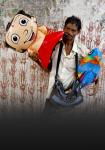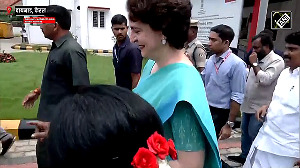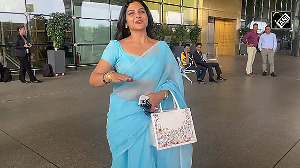'Amit Shah and his fellow travellers need to realise that India was divided because of competitive communalism of forces like Hindu Mahasabha and the Muslim League, prodded, aided and abetted by the colonial power,' says Mohammad Sajjad.

Bharatiya Janata Party President Amit A Shah, delivering the first Bankim Chandra Chattopadhyay Memorial Lecture in Kolkata last week, claimed to be a student of history and in that capacity he sort of delivered a verdict that India's Partition was because of divisions over Vande Mataram.
In his urge to put all the blame for Partition on the Congress, Shah called it the first of the appeasement policies of the Congress ministries of 1937 which, according to him, eventually resulted in India's Partition.
Quite significantly, the self-proclaimed historian in Shah tried to absolve the British policy of divide and rule as well as the Muslim League's two-nation theory as factors behind Partition.
Shah sees a 'geo-cultural nationalism' in Vande Mataram. Thus, he reasserts the exclusion of certain groups and endorses/reiterates the anti-Muslim hatred articulated in Bankim Chandra Chattopadhyay's 1882 novel Anand Math in which the song is featured.
In this context, we should look at an important aspect of the song.
The story-context of the poem is exclusionary and offensive because of the fact that the whole narrative and the story-line of Bankim's novel is full of hatred against the Mleccha (Muslims).
Moreover, the end of the novel welcomes British rule in India.
In the novel, a band of sanyasis or religious militia who call themselves santan (children) of Bharat Mata overthrow a Mleccha (Muslim) 'tyrant', destroy the cities of Muslims, and exhort that these 'dirty people' should be thrown into the rivers; they set all the Muslim homes in their way on fire.
Atrocities against Muslims is a recurrent theme in the novel and is concluded in a way that is worth noticing.
The mission of the santan is accomplished; they assemble around their guru and ask that even though they had succeeded in overthrowing the Muslim rulers, they failed to replace them by a Hindu ruler; rather, the British have now occupied Calcutta.
The guru, however, consoles his disciples by saying that Hinduism is rich in spiritual strength, but deficient in material strength, and they would overcome this deficiency with the help of the British. Therefore they should welcome British rule.
Contrast this with Rabindranath Tagore's novel Ghare Baire. Its protagonist Nikhil is uncomfortable with Vande Mataram, its exclusionary notion of nationalism, as it displays hatred against a particular group of people -- Muslims.
A highly motivated attempt by the chief of the party in power, at over-simplification of historical events or processes, is something which necessitates an even more nuanced rejoinder from a professional historian.
It is a lesser known fact of history that a Bhadralok, Chandranath Basu (1844-1910), is counted among one of the earliest proponents of Hindutva. More than three decades before V D Savarkar's tract Hindutva (1923), Basu published Hindutva (1892) in Bengali. He was also associated with Bankim's journal, Bangadarshan.
Historian Joya Chatterjee, in her 1995 book Bengal Divided: Hindu Communalism and Partition, 1932-47, puts it in a much more forthright manner, elaborating upon the culture and communalism of the Bhadralok.
She argues that in 1905, the Bhadralok stood against the partition of Bengal along religious lines, but in 1947, when the definitive partition of Bengal took place, this was preceded by an organised agitation demanding the partition of the province along religious lines again by the very same social class of Bhadralok, the zamindar and rent-receiving class.
'This avowedly modern, progressive, and anglicised Bhadralok nationalism drew inspiration (from) Hindu revivalist ideologies... This reactionary shift emanated from the threat that was presented to the (Hindu) elites by the economic depression of 1930s, and by the McDonald's Award and Poona Pact of 1932, which further reduced high-caste Hindus to a small minority in a (legislative) House which they had always expected to dominate.'
'This drove the Bengali Hindu elites from anti-British (and anti-Western) themes to an anti-Muslim posture' by 1947.
Similar findings are made out by T C A Raghavan's essay (1983), with regard to western India and Punjab, and Neeti Nair's book, Changing Homelands (2011), with regard to the Punjab.
These versions of history of India's Partition need to be popularised.
The intransigence of the Hindu Mahasabha in torpedoing the Motilal Nehru report (1928) is often ignored while accounting for the factors of Partition, wherein the Mahasabha had agreed to grant one-third representation to Muslims in the central legislative assembly in exchange for dropping separate electorates.
But it soon reneged and this is how the Hindu right-wing vetoed a due share of representation to minorities, pushing Mohammed Ali Jinnah towards 'parting of ways'.
Amit Shah indicting the Congress is also an indictment of Gandhi, Nehru, Patel, Azad, Bose, and every such maker of modern India who dreamt of a pluralist India, as against the exclusionary and hate-filled nationalism championed by the communal forces among the majority and minority communities.
True, many Mahasabhites had infiltrated into the provincial and lower units of the Congress.
In the desperate saffron urge to blame the Congress, they blindly move on to absolving the British colonial power and even the Muslim League as well.
Amit A Shah and his fellow travellers need to realise that India was divided because of competitive communalism of the forces like Hindu Mahasabha and the Muslim League, prodded, aided and abetted by the colonial power.
That the colonial masters made the Mahasabha align with the Muslim League in Bengal, Sindh and North West Frontier Province, in 1942, to form a coalition ministry, when Congress leaders were in prison for the Quit India movement, is the kind of historical fact that Amit A Shah and his party would like to downplay in order to avoid embarrassment.
To sum up, from Bankim's novel Anand Math to the last big mass movement against colonialism, the story of those forces who are vocal about Vande Mataram is that of outrageously slavish compromises with the colonial masters.
This is a brand of nationalism which is neither anti-colonial nor socially inclusive.
Indians desperately need to rescue their pluralistic and harmonious nationalism from the clutches of the hate-mongers.
Agreed this is no easy task, but then there is no other way.
Professor Mohammad Sajjad is at the Centre of Advanced Study in History, Aligarh Muslim University.






